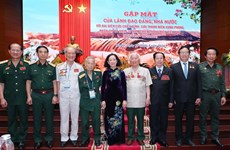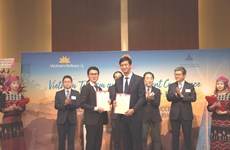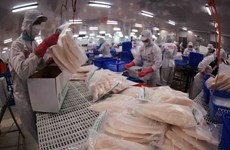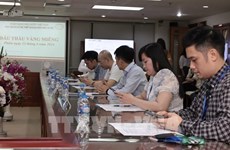Vietnamese firms need a global mindset
Tran Huu Huynh, head of the Vietnam Chamber of Commerce and Industry
(VVCI)'s Advisory Committee on International Trade Policies, tells Hai
Quan (Customs) that local enterprises should unite and practise an open
management policy to remain competitive.
Tran Huu Huynh, head of the Vietnam Chamber of Commerce and Industry
(VVCI)'s Advisory Committee on International Trade Policies, tells Hai
Quan (Customs) that local enterprises should unite and practise an open
management policy to remain competitive.
* What are your thoughts about Vietnamese enterprises' ability to maximise the opportunities international integration will present?
I want to divide the integration process into three stages.
Between 1995 and 2000, Vietnam joined ASEAN and signed the US-Vietnam Bilateral Trade Agreement.
During the second stage, from 2001-2007, Vietnam entered a new stage with wider international integration starting by joining the World Trade Organisation and signing bilateral FTAs with other countries in the region.
And in the third stage, from 2007 up to now, Vietnam has negotiated and signed bilateral agreements with 12 countries which are future members of the Trans Pacific Partnership Trade Agreement (TPP) and the Vietnam-EU Free Trade Area.
During this process, the Vietnamese Government in particular and the State in general has carried out administrative reforms, including revisions to the Investment Law and the Enterprise Law along the lines of transparency in the business environment, while minimising administrative costs.
However, according to a survey conducted by the Vietnam Chamber of Commerce (VCCI), only 37 percent of over 300 business associations expressed an interest in international business policies, and only 30 percent of Vietnamese enterprises had received advice from experts.
Another survey conducted by the VCCI showed that some 80 percent of Vietnamese enterprises had heard about the concept of integration, but not in detail. They didn't know how to access Government support for international integration. That's why there are two main trends among enterprises. Firstly, they keep calling on the government to give them further trade protection, a thing that Vietnam cannot do under international commitments. Secondly, the enterprises have failed to make the best use of "the gap" in agreements which Vietnam is a signatory to, including the Government's policies on credit support, export support, quotas and licensing.
* According to the integration process, the Government's support policies will have to be gradually cut back. That means there is not much time for enterprises to utilise "the gap". Do you agree?
I think the Government will try to issue policies or mechanisms to help enterprises in the process of international integration. Of course, these will not break what Vietnam has committed to. For example, the enterprises should not ask the Government to increase import tariffs to protect Vietnamese enterprises. As a signatory to any FTA or other bilateral agreements, we can only cut down import tariffs, not increase them.
* What about other areas?
In the past, non-tariff measures, including licences or quotas, were something we could intervene in, but now it is totally prohibited.
I think technical barries and quarantine measures are tools that we can use to help Vietnamese enterprises gain an advantage over foreign exporters. On a level playing field, this is the only tool we have to protect our domestic products.
* What should Vietnamese enterprises change to adapt to the new situation?
This is a very difficult question to answer.
As you know, this new generation of FTAs include very high standards, particularly the TPP. There are 12 TPP members, and most of them are developed countries. Only Vietnam is a middle-income country. This is a disadvantage for us, particularly in the area of public procurement, trade unions, the environment and labour. In my opinion, these issues are big challenges for us, but during the negotiations, we have asked for transitional periods.
The capacity of our enterprises is also very weak. Though Vietnam has integrated internally for dozens of years, the majority of our enterprises are small and medium, and there are only a few big economic groups.
The Government should continue to stabilise the macroeconomy while trying to practise free trade as written in the 2013 Constitution.
Secondly, we should make use of technical barrier and quarantine measures.
And finally, enterprises should adopt a global mindset. They should unite and practise an open policy on enterprise management or else FDI companies based in the country will take this opportunity away from local firms.-VNA
* What are your thoughts about Vietnamese enterprises' ability to maximise the opportunities international integration will present?
I want to divide the integration process into three stages.
Between 1995 and 2000, Vietnam joined ASEAN and signed the US-Vietnam Bilateral Trade Agreement.
During the second stage, from 2001-2007, Vietnam entered a new stage with wider international integration starting by joining the World Trade Organisation and signing bilateral FTAs with other countries in the region.
And in the third stage, from 2007 up to now, Vietnam has negotiated and signed bilateral agreements with 12 countries which are future members of the Trans Pacific Partnership Trade Agreement (TPP) and the Vietnam-EU Free Trade Area.
During this process, the Vietnamese Government in particular and the State in general has carried out administrative reforms, including revisions to the Investment Law and the Enterprise Law along the lines of transparency in the business environment, while minimising administrative costs.
However, according to a survey conducted by the Vietnam Chamber of Commerce (VCCI), only 37 percent of over 300 business associations expressed an interest in international business policies, and only 30 percent of Vietnamese enterprises had received advice from experts.
Another survey conducted by the VCCI showed that some 80 percent of Vietnamese enterprises had heard about the concept of integration, but not in detail. They didn't know how to access Government support for international integration. That's why there are two main trends among enterprises. Firstly, they keep calling on the government to give them further trade protection, a thing that Vietnam cannot do under international commitments. Secondly, the enterprises have failed to make the best use of "the gap" in agreements which Vietnam is a signatory to, including the Government's policies on credit support, export support, quotas and licensing.
* According to the integration process, the Government's support policies will have to be gradually cut back. That means there is not much time for enterprises to utilise "the gap". Do you agree?
I think the Government will try to issue policies or mechanisms to help enterprises in the process of international integration. Of course, these will not break what Vietnam has committed to. For example, the enterprises should not ask the Government to increase import tariffs to protect Vietnamese enterprises. As a signatory to any FTA or other bilateral agreements, we can only cut down import tariffs, not increase them.
* What about other areas?
In the past, non-tariff measures, including licences or quotas, were something we could intervene in, but now it is totally prohibited.
I think technical barries and quarantine measures are tools that we can use to help Vietnamese enterprises gain an advantage over foreign exporters. On a level playing field, this is the only tool we have to protect our domestic products.
* What should Vietnamese enterprises change to adapt to the new situation?
This is a very difficult question to answer.
As you know, this new generation of FTAs include very high standards, particularly the TPP. There are 12 TPP members, and most of them are developed countries. Only Vietnam is a middle-income country. This is a disadvantage for us, particularly in the area of public procurement, trade unions, the environment and labour. In my opinion, these issues are big challenges for us, but during the negotiations, we have asked for transitional periods.
The capacity of our enterprises is also very weak. Though Vietnam has integrated internally for dozens of years, the majority of our enterprises are small and medium, and there are only a few big economic groups.
The Government should continue to stabilise the macroeconomy while trying to practise free trade as written in the 2013 Constitution.
Secondly, we should make use of technical barrier and quarantine measures.
And finally, enterprises should adopt a global mindset. They should unite and practise an open policy on enterprise management or else FDI companies based in the country will take this opportunity away from local firms.-VNA













